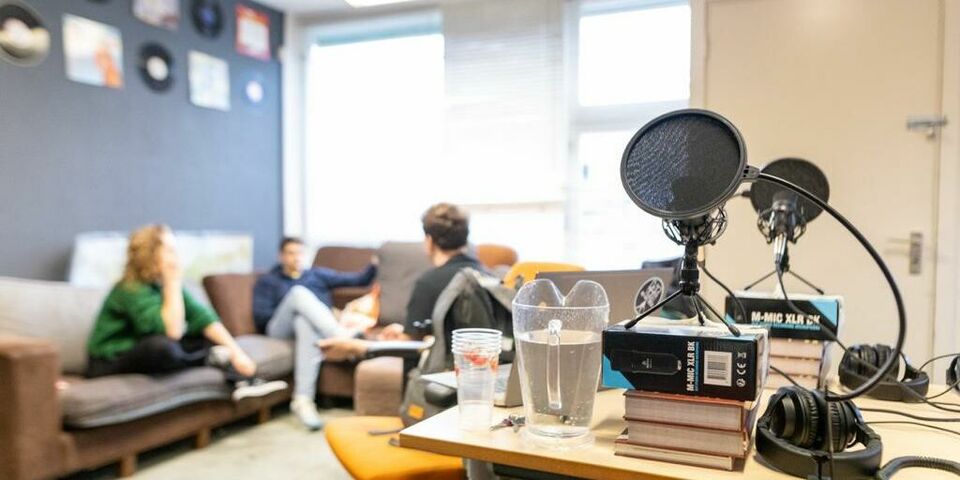Second season launches of student podcast Mentalitijd
To bring issues that students are struggling with out into the open: this aim motivated a group of students at SSRE to start the Mentalitijd podcast last year. It was a big hit. In all, the six episodes on Spotify were listened to more than four thousand times, with audience figures spiking for the episode on depression, a topic season two will be exploring in more depth. The new series will also see the students and professionals discussing loneliness, relationships, and the stress involved in making choices.
Knowing that you're not the only one; it was a point that came up in every episode of last season's Mentalitijd podcast series, says Renske Lijcklama à Nijeholt, a third-year student of Psychology & Technology whose involvement in the project started last year. “Thinking about it rationally, you know that other people are walking around with the same problems as you, but somehow it just doesn't feel like that.” Literally hearing someone else say it can help and, as the student knows, a podcast is a great vehicle for that. “What also helps is that a podcast is so easy to access. It's entirely up to you when and how you listen, and no one needs to know that you're tuning into an episode.” Without having to take part in a discussion, students get to hear other people sharing how they deal with things like the pressure to achieve, sexual harassment or depression.
That the podcast has been listened to so often is confirmation to the creators that all is not well when it comes to student welfare. They've already seen signs of this for themselves in those around them. But what has shocked them is the number of times the episode on depression has been accessed, says Siemen van Lierop, also a student Psychology & Technology, and a member of the committee that produced the podcast. “It's scary to think that this is evidently something a lot of people are struggling with.” Also striking is the fact that even though the episode is a year old, only last week it was accessed sixty times, adds Lijcklama à Nijeholt.
Bawling on the sofa
For this reason, the students decided to tackle this subject in more depth in season two, says Lijcklama à Nijeholt. “We've split it up into insecurity, suicide and loneliness.” In an episode on pressure to achieve, Van Lierop joins the discussion in the role of guest. “We talk about career stress, taking on too many committees to make your résumé look good, burnouts and stress. Personally, I've not had a burnout, but I am aware that the reason I'm on all my committees is not because it's always enjoyable, but because it's good for my future career. I've also felt really under pressure from a lot of things I've had going on. And at times I've found myself sat on the sofa, bawling and wondering, why I am doing all this?”
Van Lierop believes that it's good to be honest about these things, not only in a podcast, but also with friends and fellow students. “That's not how we do things though. If people ask you why you're not coming to the bar, for instance, it would be normal to say that you've got an assignment to do, or a deadline coming up. It would surprise your friends if you said you were feeling down, though they'd be more understanding if you did. And it would allow them to be more supportive.”We're not suggesting you mention your burnout every time you go for a beer, says Lijcklama à Nijeholt, but it would certainly help, the podcast team believes, if students discussed problems like these among themselves more often.
Professional guests
The podcast team isn't shying away from any difficult subjects. In the upcoming season they are considering devoting an episode to suicide. How do they decide how to approach these topics, some of them so heavy? “We make sure we have guests who are highly knowledgeable professionals. As well as setting the context, they engage in discussion with the students taking part in the podcast,” explains Van Lierop. “This ensures that the students feel safe talking about things.” So although the approach is partially decided beforehand, it's really the guest's choice, says Lijcklama à Nijeholt. “Before the recording, we talk in-depth with our guest. Our prep for these sessions includes coming up with questions of our own, although afterwards we might jettison eight out of ten of these and choose a particular line of approach suggested by the our guest.”
The reactions the students have received to the podcast have been mainly favorable, but the odd criticism has also been voiced. Lijcklama à Nijeholt, for example, who herself appeared in an episode on sexual harassment, was taken to task for a comment she made. “I said something along the lines of, 'If someone patted my bum some time, I wouldn't lose any sleep over it.'” But the whole point is that the students want to come at issues from a range of perspectives, says Klaas Wijnsma, committee member and a student of Applied Physics. “The podcast doesn't need to be politically correct. We just want to be open about how we think about things. If I'm taking part in an episode on insecurity and I'm not feeling insecure, I'm not going to pretend I am. We want to present an honest narrative.”
The first episode of the second season of the Dutch podcast is about the pressure to achieve. It will be available on Spotify and Google Podcasts from the 21st of December. You can also listen to all episodes of the first season on those channels.



Discussion